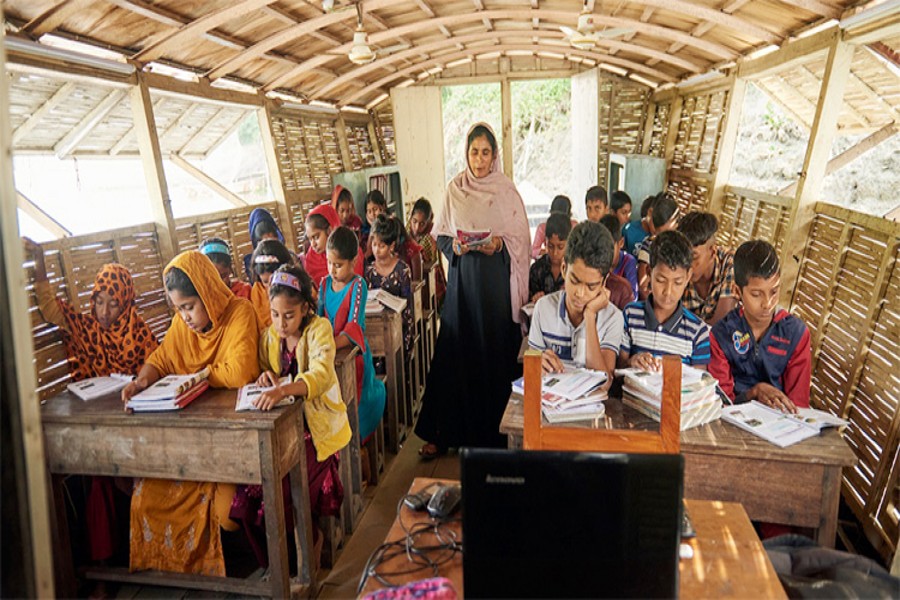
Published :
Updated :

Many schools in Chalanbil area under Chatmohar Upazila in the district remain almost closed during rainy season, disrupting educational activities of children.
In 2002, architect Mohammad Rezwan took the initiative to establish the floating school to provide academic education to children.
On the other hand, there are floating libraries, healthcare centres, training centres, playgrounds and floating agricultural farms there.
After the Bangladesh government included its innovation (floating school) in the National Adaptation Plan (2023-2050), the school has now become world-renowned.
Recently, its inventor, architect Rezwan, has been selected as the 2025 'Yale World Fellow'. Every year, Yale University in the United States offers this leadership fellowship.
This is one of the most competitive and prestigious fellowship programmes in the world. Rezwan's floating school concept has previously been recognised as an innovation by various United Nations funds and programmes (UNICEF, UNEP and UNDP).
In 2019, the British book 'Earth Heroes' recognised him as one of the world's 20 'Earth Heroes'. Rezwan and his floating school are now included in primary and secondary school textbooks in various countries, including the US, the UK, Japan and Taiwan.
This year, 16 distinguished leaders from over 4,200 nominees from around the world have been selected as 'Yale World Fellows'. They have made significant contributions to governance, climate change, business, media, law, technology and cultural development. Only three of them work in non-profit organisations (NGOs).
According to the 'Yale World Fellows' information, in addition to Rezwan, the 2025 fellows include Swedish green business advocate Mathias Wickstrom, former Georgian parliament vice-speaker and democracy expert Tamar Chugoshvili, world-renowned Nigerian singer Bukola Elemide (ASA), Egyptian filmmaker Mariam El Marakeshi and Paraguay's leading judicial figure Vivian Nunez.
The 'Yale World Fellows' programme is a four-month full-time residential programme; which is run by Yale University's International Leadership Center and is located at the Jackson School of Global Affairs.
Emma Skye, director of the Yale International Leadership Center, said, "Floating schools are not only the hope of Bangladesh, but now of the whole world.
The sustainable model of floating education invented by Rezwan is playing an important role in addressing the climate crisis. The initiatives he led over the past two decades have shown that local innovation in climate adaptation can have a global impact, not just in one country.
Architect Rezwan grew up in a remote area of Chalanbil, where floods closed schools every year, made people's livelihoods precarious, and disrupted basic services.
But, he did not just see the problem as a crisis, but instead found a new solution. His organisation, Sidhulai Self-Help Organisation, implemented the world's first floating school concept in 2002.
These schools, run on solar-powered boats, ensure children have access to education even in times of flood. Not just education, Rezwan's initiatives have expanded to include floating libraries, healthcare centres, training centres, playgrounds and floating agricultural farms.
The Bangladesh government has included his innovation (floating schools) in the National Adaptation Plan (2023-2050).
His innovative model has been successfully replicated in eight countries in Asia and Africa so far.
As a global fellow, Rezwan will lecture and mentor Yale University students during the fall semester (August-December). He will participate in global discussions on climate change and education development, conduct research, and showcase Bangladesh's experience on a global scale.
Mohammad Rezwan told The Financial Express, "This recognition is for all the struggling people of Bangladesh who have constantly inspired us. It is because of the inspiration we have received from them that we have been able to prove that new solutions can come from anywhere in the world."
"Hopefully, this recognition from Yale University will allow the Sidhulai Floating School model of climate adaptation and education development to be expanded more widely on a global scale."
motiarfe@gmail.com


 For all latest news, follow The Financial Express Google News channel.
For all latest news, follow The Financial Express Google News channel.